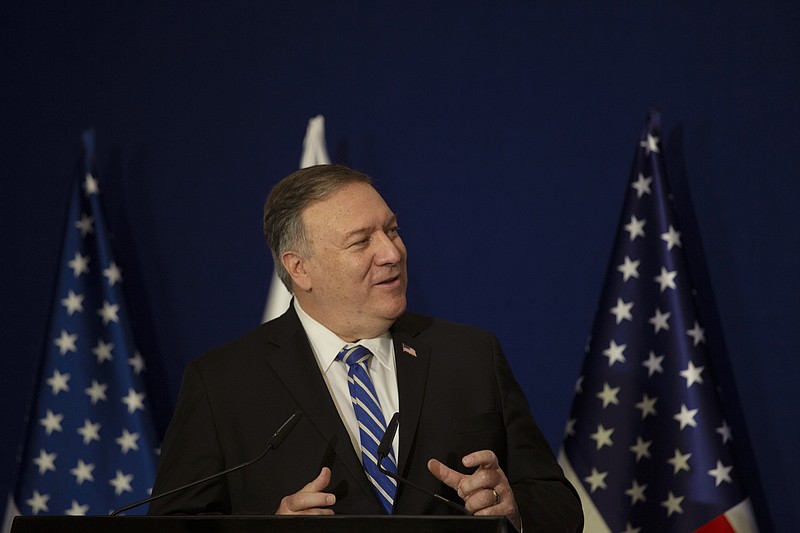JERUSALEM (AP) - U.S. Secretary of State Mike Pompeo on Thursday became the first top American diplomat to visit an Israeli settlement in the occupied West Bank as the State Department in a major policy shift announced products from the settlements can be labeled "Made in Israel."
The two moves reflected the Trump administration's acceptance of Israeli settlements, which the Palestinians and most of the international community view as a violation of international law and a major obstacle to peace.
Pompeo also announced the U.S. would brand the international Palestinian-led boycott movement against Israel as "anti-Semitic" and bar any groups that participate in it from receiving government funding. It was not immediately clear which groups would be affected by the move.
Pompeo's announcements were largely symbolic and could be reversed by the incoming administration of President-elect Joe Biden, who has promised a more evenhanded approach to Israel and the Palestinians. Nonetheless, they illustrated the deep ties between the outgoing Trump administration and the hard-line government of Israeli Prime Minister Benjamin Netanyahu.
In a Twitter post, Pompeo confirmed his visit to the Psagot winery, located in a settlement near Jerusalem, which released a blended red named for the secretary last year in gratitude for his stance on the settlements. Reporters were not allowed to accompany him.
"Enjoyed lunch at the scenic Psagot Winery today," he tweeted. "Unfortunately, Psagot and other businesses have been targeted by pernicious EU labeling efforts that facilitate the boycott of Israeli companies. The U.S. stands with Israel and will not tolerate any form of delegitimization."
The European Union, like most of the world, opposes Israeli settlements and requires imports from the occupied territory to be labeled as coming from the West Bank.
Pompeo later visited the Golan Heights, a strategic plateau Israel captured from Syria in the 1967 Mideast war and later annexed. In a break from the rest of the international community, the Trump administration recognized the territory as part of Israel last year.
Pompeo was joined by Israeli Foreign Minister Gabi Ashkenazi and Avigdor Kahalani, a decorated retired Israeli general famous for leading Israeli forces against a Syrian tank invasion during the 1973 Mideast war.
"You can't stand here and stare out at what's across the border and deny the central thing that President Trump recognized, what the previous presidents have refused to do," Pompeo said. "This is a part of Israel and a central part of Israel."
Pompeo had earlier announced the U.S. will regard the Palestinian-led boycott movement as "anti-Semitic" and cut off government support for any organizations taking part in it, a step that could deny funding to Palestinian and international human rights groups.
"We will regard the global, anti-Israel BDS campaign as anti-Semitic," Pompeo said, referring to the Boycott, Divestment and Sanctions movement.
"We will immediately take steps to identify organizations that engage in hateful BDS conduct and withdraw U.S. government support for such groups," he said, adding all nations should "recognize the BDS movement for the cancer that it is."
BDS organizers cast their movement as a non-violent way of protesting Israel's policies toward the Palestinians modeled on the campaign that helped end apartheid in South Africa. The movement has had some limited success over the years, particularly on college campuses and with artists and entertainers, but no impact on the Israeli economy.
Israel views BDS as an assault on its very existence, and has seized on statements by some supporters to accuse it of anti-Semitism, allegations denied by organizers.
In a statement, the BDS movement reiterated its rejection of "all forms of racism, including anti-Jewish racism," and accused the U.S. and Israel of trying to silence advocacy for Palestinian rights.

